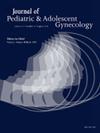10. Addressing Adolescent Sexual and Reproductive Health Needs during Inpatient Psychiatric Admission
IF 1.7
4区 医学
Q3 OBSTETRICS & GYNECOLOGY
引用次数: 0
Abstract
Background
Both adolescents and people with psychiatric disorders are disproportionately affected by adverse sexual and reproductive health (SRH) outcomes but little is known about their specific SRH needs. Inpatient settings provide a unique opportunity to address SRH concerns because adolescents often miss out on school-based SRH education when hospitalized. The primary objective was to identify adolescent patients’ perceptions of the SRH services they are receiving at an inpatient adolescent psychiatric unit in Honolulu, Hawai'i.
Methods
The Queen's Medical Center Institutional Review Board (IRB; protocol RA-2020-26) approved this qualitative research study. We identified patients aged 14-19 admitted to the inpatient psychiatric unit who had received SRH care during their current admission. Permission to approach patients was obtained from the patient's primary attending and written informed consent was obtained at the time of each interview. We conducted semi-structured interviews with participants about their experiences with SRH care until thematic saturation was reached. The interviews were recorded, transcribed, and analyzed through the iterative process of content analysis to identify themes and relationships between ideas.
Results
Eleven adolescents were interviewed from 2022-2023. We collected patient demographics and clinical characteristics, including race, diagnosis, and type of SRH services received. Six themes were identified: 1) patients value healthcare providers’ experience and expertise, 2) inpatient hospitalization is an appropriate time to address SRH needs, 3) interaction between mental health and decision making for SRH choices is complex, 4) access to SRH care in the outpatient setting is variable and dependent on social factors, 5) female family members play a key role in SRH care, and 6) most patients received SRH education in school and deemed school is an appropriate place to learn this information despite some negative aspects of the school-based setting.
Conclusions
This study revealed the important role of healthcare providers in the inpatient setting and female family members in the outpatient setting in supporting adolescents with psychiatric disorders and their SRH needs. Healthcare providers are accessible to adolescents during an inpatient admission while access in the outpatient setting can be highly dependent on social support factors. The inpatient setting is a valuable place to address adolescents’ SRH needs and should be linked to outpatient resources for continuity of care following hospital discharge.
10. 解决青少年在精神科住院期间的性健康和生殖健康需求
背景青少年和精神疾病患者受到不良性健康和生殖健康(SRH)结果的影响尤为严重,但人们对他们在性健康和生殖健康方面的具体需求却知之甚少。住院环境为解决性健康和生殖健康问题提供了一个独特的机会,因为青少年住院时往往错过了学校的性健康和生殖健康教育。本研究的主要目的是确定青少年患者对他们在夏威夷檀香山青少年精神病住院部所接受的性健康和生殖健康服务的看法。我们确定了入住精神科住院病房的 14-19 岁患者,这些患者在本次入院期间接受了性健康和生殖健康护理。我们从患者的主治医生处获得了与患者接触的许可,并在每次访谈时获得了患者的书面知情同意。我们对参与者进行了半结构化访谈,了解他们在性健康和生殖健康护理方面的经历,直至达到主题饱和。我们对访谈进行了记录、转录,并通过内容分析的迭代过程进行分析,以确定主题和观点之间的关系。我们收集了患者的人口统计学特征和临床特征,包括种族、诊断和所接受的性健康和生殖健康服务类型。我们确定了六个主题:1)患者重视医疗服务提供者的经验和专业知识;2)住院治疗是满足性健康和生殖健康需求的适当时机;3)心理健康与性健康和生殖健康选择决策之间的相互作用非常复杂;4)在门诊环境中获得性健康和生殖健康护理的机会是可变的,并取决于社会因素;5)女性家庭成员在性健康和生殖健康护理中发挥着关键作用;6)大多数患者在学校接受了性健康和生殖健康教育,并认为学校是了解这些信息的适当场所,尽管学校环境存在一些负面因素。结论 本研究揭示了住院环境中的医疗服务提供者和门诊环境中的女性家庭成员在支持患有精神障碍的青少年及其性健康和生殖健康需求方面所发挥的重要作用。在住院期间,青少年可以接触到医疗服务提供者,而在门诊环境中,能否接触到医疗服务提供者则在很大程度上取决于社会支持因素。住院环境是满足青少年性健康和生殖健康需求的重要场所,应将住院环境与门诊资源联系起来,以保证出院后护理的连续性。
本文章由计算机程序翻译,如有差异,请以英文原文为准。
求助全文
约1分钟内获得全文
求助全文
来源期刊
CiteScore
3.90
自引率
11.10%
发文量
251
审稿时长
57 days
期刊介绍:
Journal of Pediatric and Adolescent Gynecology includes all aspects of clinical and basic science research in pediatric and adolescent gynecology. The Journal draws on expertise from a variety of disciplines including pediatrics, obstetrics and gynecology, reproduction and gynecology, reproductive and pediatric endocrinology, genetics, and molecular biology.
The Journal of Pediatric and Adolescent Gynecology features original studies, review articles, book and literature reviews, letters to the editor, and communications in brief. It is an essential resource for the libraries of OB/GYN specialists, as well as pediatricians and primary care physicians.

 求助内容:
求助内容: 应助结果提醒方式:
应助结果提醒方式:


